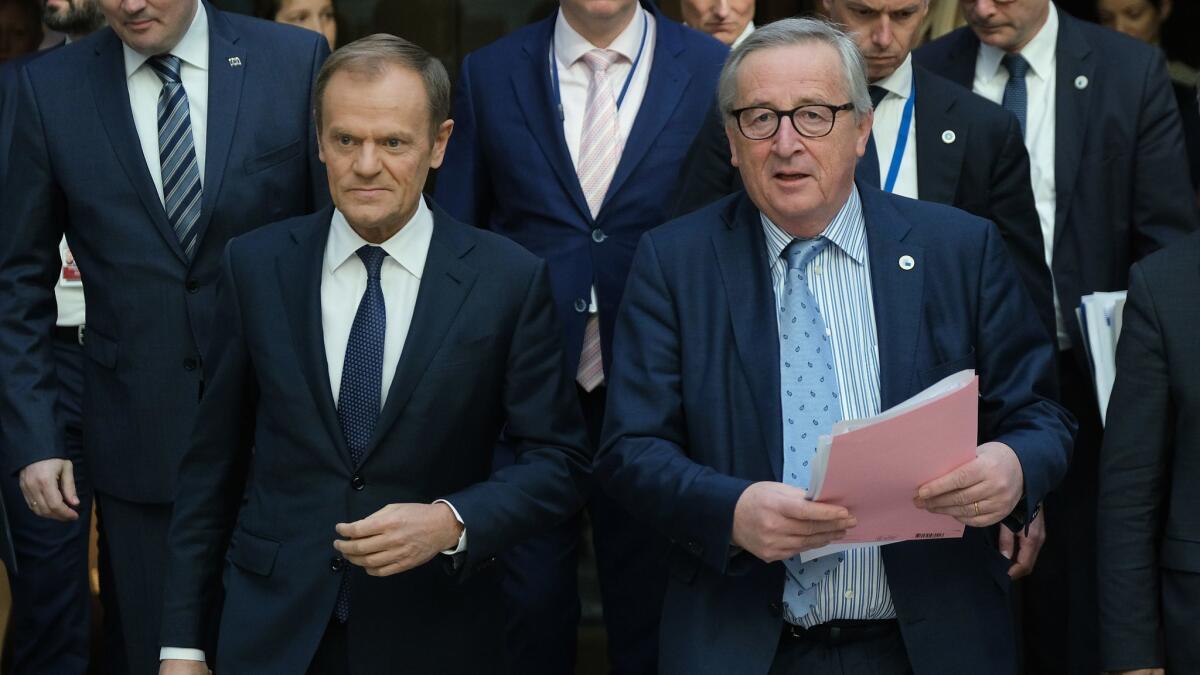EU takes charge, forces Brexit deadlines on British Prime Minister Theresa May

- Share via
Reporting from Brussels — British Prime Minister Theresa May will be laboring again to win backers in Parliament for her unloved Brexit deal, this time to a timetable dictated by the European Union.
Almost three years after Britons voted to walk away from the EU, the bloc’s leaders seized control of the Brexit timetable from May to avert a chaotic departure at the end of this month that would be disruptive for the world’s biggest trading bloc and deeply damaging for Britain.
“We are prepared for the worst but hope for the best,” European Council President Donald Tusk said Friday. “As you know, hope dies last.”
May’s mantra since Britain’s EU membership referendum in 2016 has always been about “taking back control” of U.K. affairs from the EU. But the process has seen her lose control — of the British Parliament, which has twice rejected her Brexit deal, and now of Britain’s date of departure.
In a move that underlined their loss of confidence in May, EU leaders set two deadlines for Britain to leave the bloc of nearly half a billion people or to take an entirely new path in considering its EU future.
At marathon late-night talks Thursday in Brussels, they rejected May’s request to extend the Brexit deadline from March 29 until June 30.
Instead, the leaders agreed to extend the Brexit date until May 22, on the eve of EU Parliament elections, if she can persuade the British Parliament to endorse the Brexit withdrawal agreement.
Failing that, May now has until April 12 to choose between leaving the bloc without a divorce deal and a radically new path, such as revoking Britain’s decision to leave, holding a new British referendum on Brexit or finding a cross-party consensus for a very different kind of Brexit.
Ending a two-day summit, Tusk said there was now nothing more the EU could do to help May.
“The fate of Brexit is in the hands of our British friends,” he said.
The EU’s choice of deadline aims to ensure that Britain doesn’t take part in the May 23-26 elections for the EU parliament if it is leaving. Britain is legally required to announce its intention of participating by April 12. As of now, Britain’s seats in the next EU Parliament have been redistributed to other nations.
The EU-wide elections are being held amid deep concerns that mainstream parties could lose seats to anti-immigrant groups and populists. EU leaders are also fearful that the contagion of Brexit — its chaos, populism, political instability and uncertainty— could spread to their nations.
French President Emmanuel Macron said Brexit offered a “political lesson” that trying to leave Europe without a plan “leads to an impasse.” Macron slammed the architects of Brexit, saying the referendum had been won by “lies.”
But he also said governments should listen to their people if they want to avoid a “disaster.”
The EU leaders seized hold of the Brexit process when May — after repeated questioning — proved unwilling or unable to tell them what she planned to do next week if she fails yet again to convince a skeptical British Parliament to endorse her Brexit deal, EU officials said.
More to Read
Sign up for Essential California
The most important California stories and recommendations in your inbox every morning.
You may occasionally receive promotional content from the Los Angeles Times.













